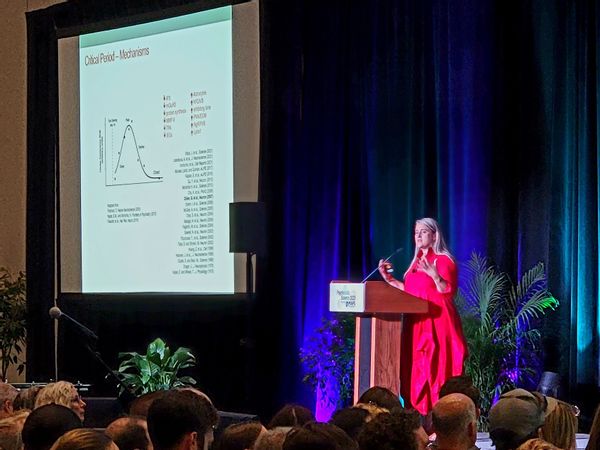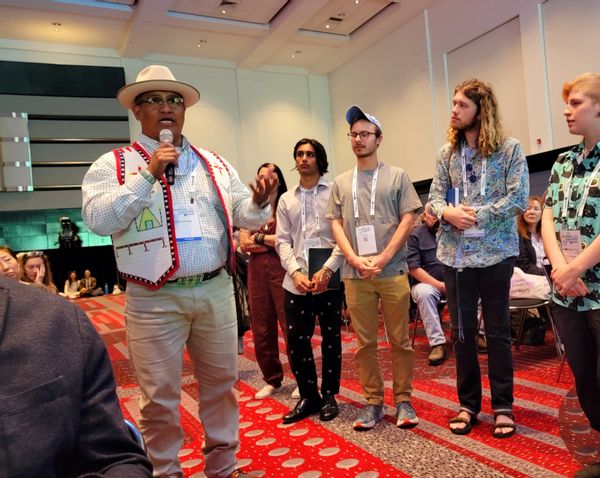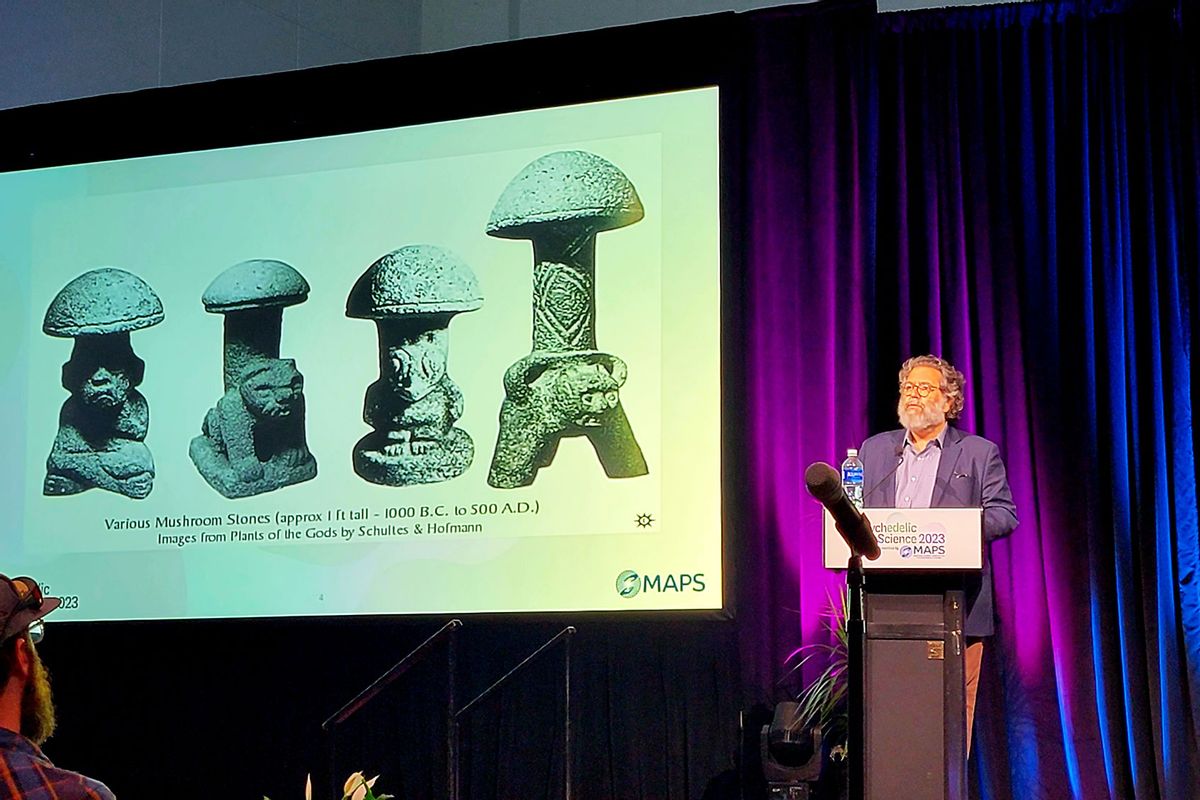At $1,800 for a business-class ticket, the Colorado Convention Center's Bellco Theater is full on Friday night with the who's-who of a burgeoning psychedelics industry that's predicted to be worth $100 billion by 2030. The dress code is "psychedelic business casual" on the final night of Psychedelic Science 2023 — the largest conference of its kind in history with more than 11,000 attending, according to event sponsors the Multidisciplinary Association for Psychedelic Studies (MAPS).
The man of the hour is MAPS President Rick Doblin. His legacy spearheading the campaign for FDA-approved MDMA trials and a lifetime spent bouncing around psychedelic research units have led him to the Denver stage. He steps out to greet a roaring crowd, ready to deliver the week-long conference's closing remarks.
That's when, from the back of the theater, the drum starts. Like a heartbeat — boom-boom, boom-boom — growing louder. Then come the shouts. A woman's voice rises above crowd, calling to the stage.
"We are Indigenous! And we have been excluded!" she shouts. "The Native coalition asks Rick Doblin: Where were you yesterday during our panel? Where is the panel for sexual assault survivors?"
"You're erasing our cultures. Please stop. Think. Please look at the cycle of colonization and how this continues to happen."
A group of protesters gather and slowly move toward the stage, drum beating steadily against a tide of jeers from a mostly white crowd that's suddenly lost its zen. Doblin, hands over his brow as he peers out from under the stage lights, tells the protesters that now's not the time. The crowd's booing grows more hostile, someone shouts "Security!" The heartbeat-drum continues.
"We tried to be as inclusive as we could be," Doblin says, pacing as the crowd starts chanting on his behalf.
Doblin seems to realize he's losing control. Finally relenting, he offers the protesters one minute of speaking time on stage. A woman takes to the mic, followed by others who climb up.
"Where are the Indigenous people of these lands? The elders?" she asks. "Where are the investors, investing in Land Back water rights?"
When she yields the mic to a young Indigenous man, he implores the crowd not to be deceived by commercial interests posing as healthcare. The crowd boos him too.
"You're erasing our cultures. Please stop. Think," he says, voice trembling. "The same happened to tobacco. Now it causes cancer. The same happened to opioids. Now it causes addiction. Same happened to coca. Now cocaine causes a lot of harm. Please look at the cycle of colonization and how this continues to happen. In 2030 and decades from now, you're going to see the medicine harming you because they are living beings and they don't like to be abused."
"This isn't a collective liberation movement. This is a capitalization and you're stepping on our plants. You're stepping on our medicines."
The Science of Risk
The chemical responsible for a psychedelic experience actually penetrates — down to the cell — a part of the brain that is otherwise hardened by a dense structure
Critics of the encroaching control of corporatizing forces in the emerging world of psychedelic research were not limited to the event's Indigenous contingent. Before being allowed to present their studies at Psychedelic Science 2023, researchers and scientists were required to sign a contract with MAPS. It included two notable clauses, as reported by Psymposia's Russell Hausfeld.
First, presenters would be barred from making appearances related to their research for a full four months (two before the event, two after) anywhere within a 500-mile radius of Denver. Second, and more controversially, presenters could be turned away if they offered any statements that "discredits MAPS or tarnishes its reputation and goodwill" (or were affiliated with an organization).
Following the publication of Psymposia's article, MAPS reportedly released all presenters from the radius clause of the contract, though the reputational clause remained — drawing concerns over potential interference with academically independent critique. But other worries appeared about MAPS' handling of scientific ethics when presenters were reportedly told that their slides which contained conflict-of-interest statements would be removed — and that the information would be tucked into the event's app.
"Unless the audience checks the app, they would have no idea if a speaker declared a COI," Psymposia's Brian Normand said in a tweet.
The clauses drew critical glances from more than just the press. MAPS sponsors some of the most advanced Food and Drug Administration clinical trials on psychedelics and continues to curry millions of dollars in donations to fund the path it's quickly charting toward FDA-approval of MDMA (sometimes called "Molly") for therapeutic use. But that path has been perilous for some, and MAPS has a history of being criticized by some of the participants in those trials.
In a notably timed Friday release, the Food and Drug Administration issued its new draft guidance on the use of psychedelic drugs in clinical research.
"FDA may place a study under an IND [investigational new drug] under clinical hold if it finds, among other reasons, that human subjects are or would be exposed to an unreasonable and significant risk of illness or injury," the agency said, noting that subjects receiving active treatment with psychedelic drugs remain in a vulnerable state for as long as 12 hours, depending on the substance.
 At Psychedelic Science 2023, neuroscientist Gül Dölan presents research on the opening of "critical periods" of cognitive development. (Photo by Rae Hodge)The agency proposed any subject being tested would need two professionals monitoring them at all times — a lead with graduate-level professional training and clinical psychotherapy experience, licensed to practice independently, and an assistant with a bachelor's degree and at least one year of experience in a licensed mental healthcare setting (though not necessarily licensed themself).
At Psychedelic Science 2023, neuroscientist Gül Dölan presents research on the opening of "critical periods" of cognitive development. (Photo by Rae Hodge)The agency proposed any subject being tested would need two professionals monitoring them at all times — a lead with graduate-level professional training and clinical psychotherapy experience, licensed to practice independently, and an assistant with a bachelor's degree and at least one year of experience in a licensed mental healthcare setting (though not necessarily licensed themself).
In 2020, Doblin told Quartz in an interview that he negotiated with the FDA to conduct psychedelic therapy with one license per two-person team.
"We do not think it's necessary or important for both people to have a license," he said, arguing the second licensed therapist could make treatment too expensive for patients.
The Science of the Sacred
Scientifically speaking, something rather miraculous happens inside the brains of mammals when we take psilocybin in a therapeutic context. The chemical responsible for a psychedelic experience actually penetrates — down to the cell — a part of the brain that is otherwise hardened by a dense structure, and unlocks a level of cognitive development that we leave behind in our early years of cognitive development.
Neuroscientist Gül Dölen called this a "critical period" — and explained to the conference crowd that this unique process could allow us to experience and heal levels of cognitive development that we haven't had access to since childhood.
Most remarkable, however, is that this effect doesn't disappear after the trip. Once the immediate effects of a mushroom trip subside after a few hours, the long-term benefits and ability to access this "critical period" remain remain available for up to two weeks more.
Want more health and science stories in your inbox? Subscribe to Salon's weekly newsletter The Vulgar Scientist.
"Where you grew up, and what culture you were raised in has a big impact on our understanding of the rules of hierarchy and dominance … So if you go to a new culture, you will struggle to adapt to the social rules if you don't have any familiarity. And so people intuited that there was a 'critical period' for this type of learning on your social environment," Dölen said.
Neuroscientist Gül Dölen called this a "critical period" that could allow us to experience and heal levels of cognitive development that we haven't had access to since childhood.
But psychedelics, she explained, are proving to offer access to a potentially wider range of critical learning periods where humans can re-learn pro-social values that could be healthy for therapeutic treatment.
There's no critical period for human psycho-spiritual development, though. While religious indoctrination is often entrenched in childrearing across both Indigenous and Abrahamic traditions, we humans are not limited to any single window of time when it comes to developing a faith in the divine through moments of religious ecstasy. Nor, among the non-religious, is there any deadline for undergoing what foundational psychologist Abraham Maslow called "peak experiences" of transcendent communion with a sense of timeless universal connectedness.
Altered states of consciousness can and do find us, at any moment throughout our lives, from dreams to orgasms to yes, taking drugs. It's this hopeful fact which drove conference-goers to overflow into hallways and scramble for seats during a packed Thursday session held by researchers from John Hopkins and New York Universities. In the course of their small but uniquely important study, the researchers gathered 24 religious clergy from 16 distinct organizations — giving each of them two high-dose psilocybin sessions, then monitoring participants for long-term changes.
Researchers were introduced by Anthony Bossis, a clinical assistant professors at NYU's Grossman School of Medicine, who told the audience that implications of psychedelic research may far exceed usefulness in the treatment of clinical disorders.
"They may promote meaning-making. They may force you into spiritual continuous dialogue. And they may be useful in consciousness and religious studies. Are we wired for meaning?," Bossis said. "And, if so, why?"
Though the participants' identities were not revealed, researchers relayed both quantitative findings of the study and the post-session statements of participating clergy. Like the words of a rabbi of the Jewish Renewal movement who, Bossis said, expressed
"The experience deepened and open my appreciation of other religions as well as my own," the rabbi told Bossis. "And I realized that each have this incredible truth. And all the truths are in all religions to some degree. Some of them just highlight one factor more than the other, but the active ingredients are all the same."
 Sandor Iron Rope, president of the Native American Church of South Dakota, addresses NYU and John Hopkins religious researchers. (Photo by Rae Hodge)Remarkably, none of the clergy reported that the experience was incompatible with their fundamental theology, or resulted in any crisis of faith — though the challenges reported included a difficulty integrating the experience into their everyday life because they didn't feel like they could talk to their communities.
Sandor Iron Rope, president of the Native American Church of South Dakota, addresses NYU and John Hopkins religious researchers. (Photo by Rae Hodge)Remarkably, none of the clergy reported that the experience was incompatible with their fundamental theology, or resulted in any crisis of faith — though the challenges reported included a difficulty integrating the experience into their everyday life because they didn't feel like they could talk to their communities.
"An experiential reference point for understanding theological beliefs. The words before, of their theological understandings may be understood conceptually or intellectually from their training. It was now felt and understood from the lived experience," said researcher and therapist Cody Swift.
"These types of studies are the only way that the Western world could really understand the correlation of Spirit and these medicines."
There are reasons to remain skeptical and wary of even the good-faith efforts of religious researchers. The long-promised psychedelic industry is steadily becoming concentrated in the hands of pharmaceutical and tech giants before it's even off the ground, it is haunted by the voices of test subjects who suffered the trauma of unethical research, and it teeters on the edge of further colonizing an Indigenous medicine at the expense of its historic stewards.
But hope persists that — if the marriage of psychedelic medicine and its cultural history is protected, and if qualitative research into our holistic human experiences is likewise seated at the table — a body politic of the psychedelic industry can still emerge which does more good than harm. Among those voices of hope are Indigenous leaders like Sandor Iron Rope, President of the Native American Church of South Dakota and board member of the Indigenous Peyote Conservation Initiative.
"These types of studies are the only way that the Western world could really understand the correlation of Spirit and these medicines," Iron Rope told the research panel Thursday. "Thank you, everybody, for understanding the Indigenous perspectives and these vital cultures. And I'm looking forward to unifying and finding balance in this life."
That sense of unification, itself the most commonly reported feeling of who undergo psychedelic experiences, is critical not only to the ecological conservation of the medicine, but to the cultural conservation of the psycho-spiritual cure the medicine has always provided humans.
Psychedelic medicine's intrinsic property is that it elicits in us a timeless sense of caring pro-social reciprocity only otherwise glimpsed in our earliest years — a critical period, one that the medicine re-opens long past the close of childhood's brief hour. And if we seek a culture-wide transformation through the use psychedelic therapies, as MAPS has claimed it does, then the medicine's rave-going euphoria and storefront availability must never be divorced from the root-deep psychological healing we ask these plants to give us as individual adults.
Reckless western industrialization and extractive capitalization of this sacred medicine, being inherently anti-social pursuits themselves, risk making the medicine completely ineffective for those who take it. Worse yet, they risk completely stripping the medicine of any cultural transformation espoused by its biggest profiteers. Or, as Bossis put it Thursday:
"The psychedelic experience alone doesn't change us — unless it changes our values and our lives."



Shares